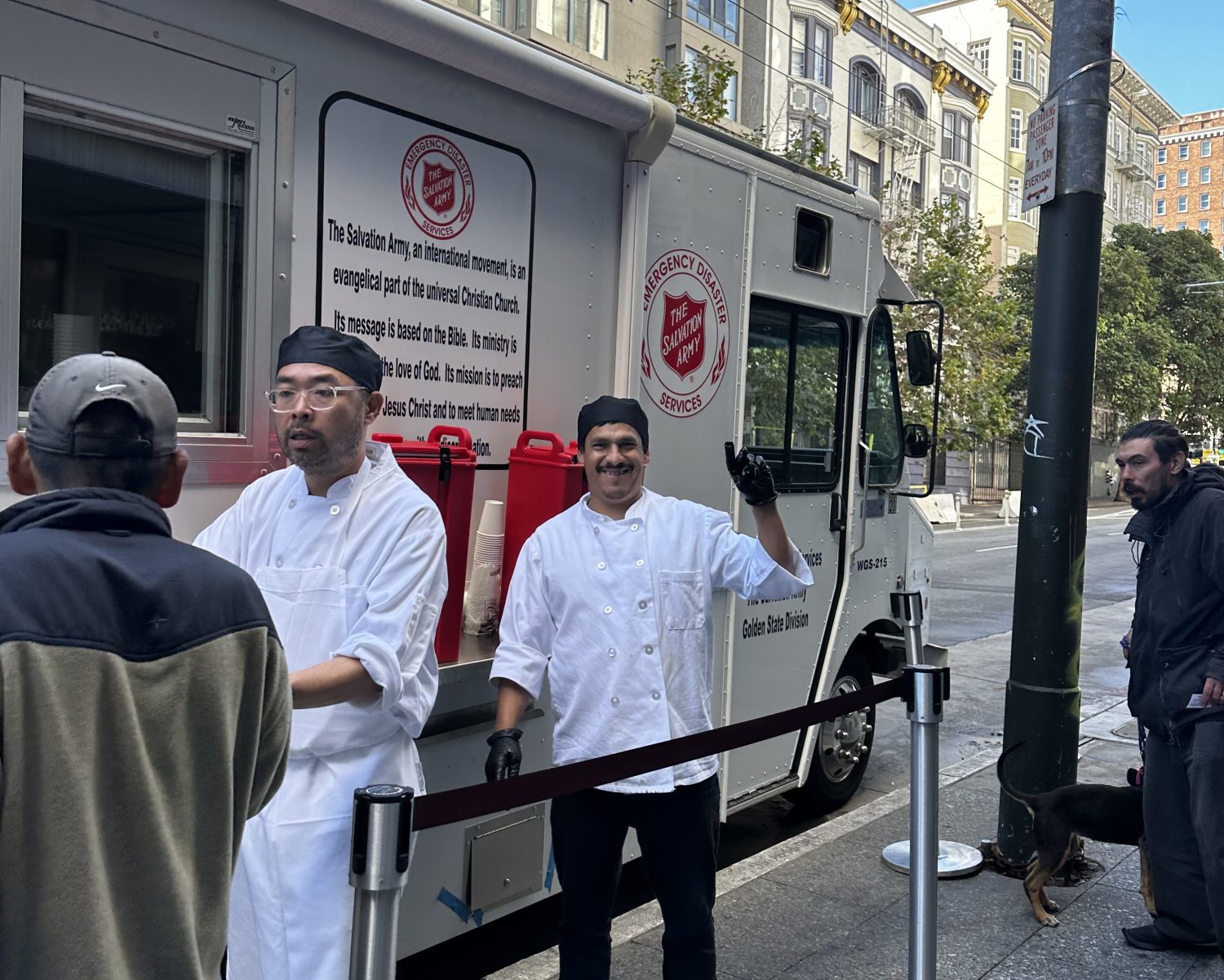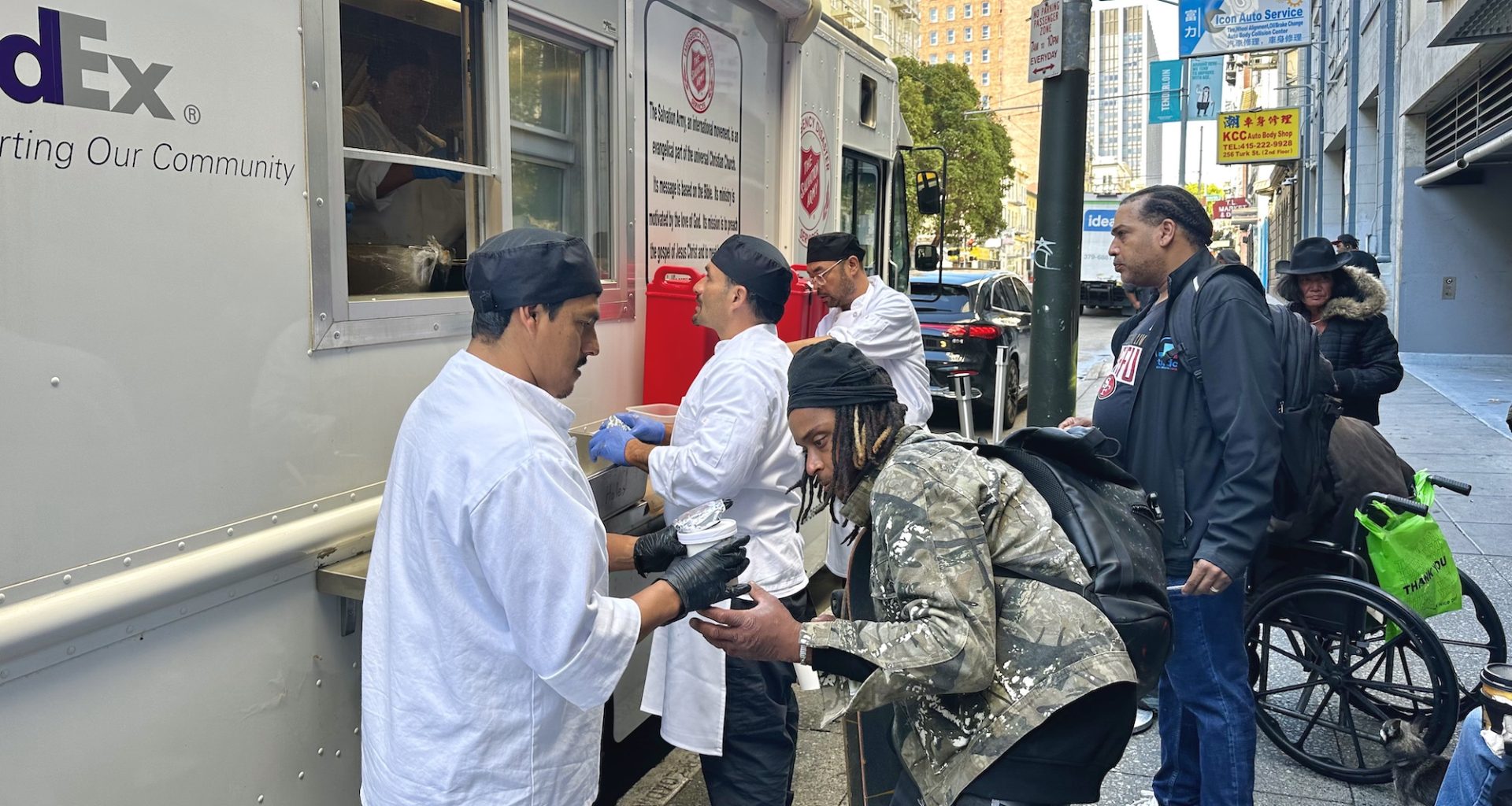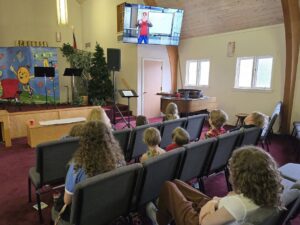About halfway through the first class of Culinary Arts Training Academy in San Francisco—a 10-week course covering everything from basic knife techniques and food terminology to safety standards and consistent performance—a student asked Chef Timothy Tucker if they could use The Salvation Army Emergency/Disaster Services mobile feeding unit parked in the program’s central kitchen location.
The result? A weekly outreach through which Culinary Arts Training Academy participants serve some 500 meals a week to people in the Tenderloin, a neighborhood known for its challenges.
“We chose the Tenderloin because of the great need when we first started. We also went to some tent areas as well,” Tucker said. “Most of the time, students say they feel incredibly grateful and feed with joy. This is partially because some of my students have been in that situation, and they are able to serve with great empathy and passion.”
Students come to the Culinary Arts Training Academy from a range of backgrounds—it’s part of The Way Out initiative, The Salvation Army San Francisco’s recovery-focused effort to address homelessness.
“The program supports people who are homeless, or people recovering from drugs and alcohol,” he said. “We have people who have never held a regular job, but then when they complete the program, we help them find one.”
Previously, Tucker led similar programs in Miami and Boston, helping hundreds of people get their lives on track.
“I loved seeing people’s faces light up with joy, from just receiving hot, good and healthy food.”
Allen “Eric” Daniels, Jr.
For Tucker, there was never a different career in mind. He started working as a busboy in a lobster house when he was a young teen, and then was given the responsibility of dishwasher at a different restaurant soon after.
Back then, he imagined himself wearing the stiff white jacket of a respected chef one day, commanding a team as they prepared meals for people who always knew the next one would come. And while that happened eventually, it didn’t stay that way.
“I’ve learned that if I plan on working in a restaurant, I’m going to work hard,” he said. “But I’d much rather put my energy into helping people.”
After culinary school in Louisville, Kentucky, Tucker hustled behind the scenes at a five-star restaurant in Dallas and perfected the art of preparing the same top-quality dish on repeat. He moved to Seattle for the same challenge, and could’ve continued riding an accolade train all across America. But instead, about 20 years ago, Tucker decided to return to Louisville.
He took a modest position at a natural medicine facility just as the public was just starting to learn about the lasting effects of processed foods. This is where his story made an even sharper turn: Tucker also began working at a homeless shelter at the Center of Hope. He liked supporting his community, but he didn’t like what those in need were expected to eat.
“The director of the Center of Hope and I worked together to build a culinary program with The Salvation Army to change what we fed to 400 clients every night,” he said. “At the time, the philosophy was, ‘Well, this is good enough.’ But because of my background, it was important for me to show that food dictates health.”
The Salvation Army supplied the commercial kitchen, and Tucker just so happened to be a highly trained culinary chef. He replaced the frozen food donations with dinner from scratch, cooking while training a staff of non-traditional students. “I was probably naive about how much I was taking on, but I was young and full of energy—only 30. The truly remarkable detail is that we got this started with just $500. Our approach was to figure it out as we went.”

Unlike Tucker, many of his students didn’t have clear career aspirations from a young age.
Allen “Eric” Daniels, Jr. started the San Francisco program last October and finished it in December. Besides learning the skills that eventually helped him land a steady job in the city, Daniels said that he also enjoyed the part of the program where he cooked and served meals like jambalaya and lasagna in the Tenderloin every Friday.
“I loved seeing people’s faces light up with joy, from just receiving hot, good and healthy food,” he said.
Daniels is a single parent to four children, and said the program changed his life. “I’m so glad Tucker accepted me,” he said. “I wasn’t getting accepted into any other program.”
Tucker mentions another student who never had her own place before the program and now proudly supports herself in her own apartment. He talks about the surrounding staff who help break addictions, and local restaurants that offer fresh starts.
Tucker said that his kitchen is strict, but that’s what’s necessary. After all, he knows that big plans are nothing without perseverance. Even if it’s now up to his students to see them through.
“I’m much more compassionate, but just as engaged,” he said. “It’s a natural evolution.”
Do Good:
- See how The Salvation Army fights hunger.












